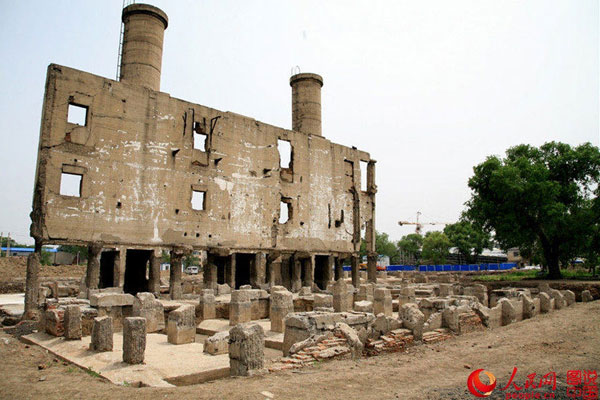

 |
| The relic of Unit 731 is located in Harbin, northeast China’s Heilongjiang province. Unit 731 was a secret biological and chemical warfare research base established in Harbin in 1935 as center of Japan's biological warfare in China and Southeast Asia during WWII. From 1939 to 1945, at Least 3,000 people were killed there, and more than 300,000 people perished due to biological weapons. The retreating Japanese invaders blew up the base to cover their crimes before they surrendered in 1945. [Photo: people.com.cn] |
Representatives of multiple Japanese civil groups slammed Japan's Foreign Ministry for denying entry of relatives of Chinese victims of Unit 731 on Thursday, saying it's an "abuse of power" which would hinder their efforts on improving Japan-China relations.
Last month, Japan rejected visa request from 12 Chinese, including families of Chinese victims of Japan's notorious Unit 731, a chemical and biological warfare research troop of the Imperial Japanese Army during World War II. They were invited to symposiums in Tokyo on wartime issues on Nov. 27-29.
Keiichiro Ichinose, a Japanese lawyer who was in charge of inviting the Chinese, told a press conference that the Japanese Embassy denied their visa request for the reason of "instructions from the Ministry of Foreign Affairs of Japan."
Ichinose pointed out that it was very abnormal since four of them had been to Japan several times before.
Japan's Foreign Ministry officials did not give specific reasons for rejecting visa applications of the Chinese.
Representatives of the organizing committee said that it was very likely that the Japanese government was not satisfied with the theme of their symposiums which would focus on "abolishing war bills and facing up to history of Japan's invasion of China and colonization of the Korean Peninsula."
Hiroshi Tanaka, a professor emeritus at Hitotsubashi University in Tokyo, said the symposium was aimed at discussing historical issues through non-governmental exchanges so as to avoid the repeat of wars.
"The visa denial would definitely damage the normal exchanges of the two peoples and put their efforts of improving bilateral relations in vain," Tanaka said.
Takakage Fujita, director general of a group established to uphold and develop the globally-accepted Murayama Statement, criticized the Foreign Ministry, saying it was an act of "abuse of power" and could not be forgiven.
The Murayama Statement, issued by then Prime Minister Tomiichi Murayama in 1995, apologized to its Asian neighbors that had suffered from Japan's colonization, war of aggression and wartime brutalities under its militaristic past.
 Charming female bodybuilders of Chengdu University
Charming female bodybuilders of Chengdu University Polish sports stars strip off for risqué calendar
Polish sports stars strip off for risqué calendar Spectacular aerial photos of the Three Gorges
Spectacular aerial photos of the Three Gorges Contestants of Mrs. Globe pose for photo in Shenzhen
Contestants of Mrs. Globe pose for photo in Shenzhen
 Bikini models attend hot pot banquet in Hefei
Bikini models attend hot pot banquet in Hefei J-10B fighters with homegrown engine in test fligh
J-10B fighters with homegrown engine in test fligh Photos of U.S. Navy intruding in South China Sea released
Photos of U.S. Navy intruding in South China Sea released Cats who immediately regretted their life choices in photographs
Cats who immediately regretted their life choices in photographs Beautiful girl from police college becomes Internet hit
Beautiful girl from police college becomes Internet hit Top 20 hottest women in the world in 2014
Top 20 hottest women in the world in 2014 Top 10 hardest languages to learn
Top 10 hardest languages to learn 10 Chinese female stars with most beautiful faces
10 Chinese female stars with most beautiful faces China’s Top 10 Unique Bridges, Highways and Roads
China’s Top 10 Unique Bridges, Highways and Roads Money for love
Money for love Unhealthy holiday
Unhealthy holiday The emperor’s new pose
The emperor’s new pose Zuckerberg sets an example for Chinese society
Zuckerberg sets an example for Chinese societyDay|Week